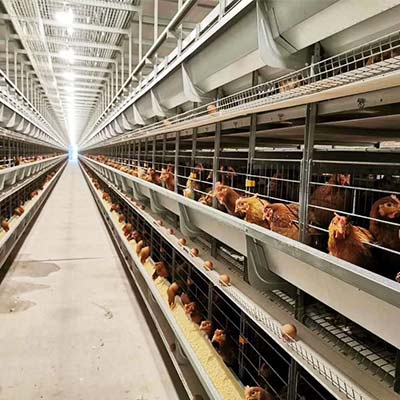The important role of baking soda in poultry farming
- font size decrease font size increase font size
With the widespread use of automatic poultry cage systems, chickens are well taken care of, but there are some simple tricks that can help chicks convert feed well. For example, adding sodium bicarbonate to the diet or drinking water can improve feed intake and growth rate of broilers raised at high temperatures. Measurements of the retention of dietary or cation-anion balance or dietary electrolyte balance do not satisfactorily predict growth and/or feed conversion responses in broilers at elevated temperatures. The improvement in body weight does not appear to be associated with an increase in body water retention.

Dietary supplementation of various levels of NaHCO3
Antibody titers against Newcastle disease were increased in chickens housed in battery chicken cages compared to diets not supplemented with Newcastle disease. Environmental stressors are known to directly or indirectly affect host immunity and innate resistance. Therefore, the increased antibody titers against Newcastle disease virus in flocks fed diets containing different levels of NaHCO3 may be due to lower body temperature or lower cortisol concentrations in these birds compared to controls Less heat stress, or both.
An increase in dietary electrolyte balance may lead to a decrease in the ratio of heterophile to lymphocytes in the blood, resulting in an increase in antibody titers. Therefore, it is safe to conclude that dietary supplementation of NaHCO3 may increase antibodies in poultry and reduce chicken sickness.
Supplementation of NaHCO3 to the laying hens showed higher protein digestibility in these flocks compared to controls. Protein consumed by birds is broken down into its constituent amino acids by certain enzymes in the digestive tract before being absorbed, and most of these amino acids require sodium for this process. Therefore, the increase in protein digestibility in the treatment group may be due to the presence of higher sodium ion concentrations in diets containing sodium bicarbonate.
Problem Description Sodium bicarbonate (NaHCO3), also known as baking soda, is 27.09% sodium, 71.91% bicarbonate, and contains no chlorides. It is an FDA-approved and "Generally Recognized as Safe" feed ingredient. Sodium bicarbonate is described as "a special ingredient because it provides sodium, beneficially affects blood pH, and provides beneficial bicarbonate.
The above is the important role of baking soda shared by poultry equipment manufacturers to promote digestion and enhance antibodies in the process of raising laying hens or broilers.
